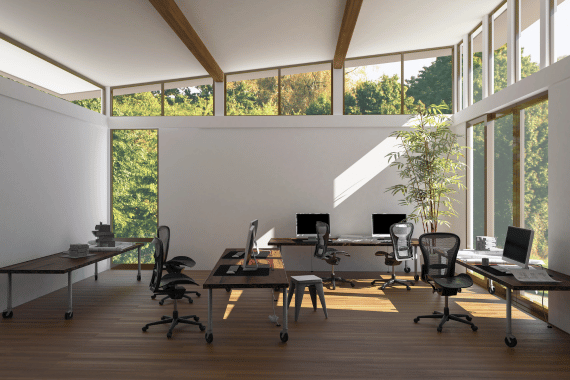The Benefits of Short-Term Office Space for Nonprofits & Charities
We know sourcing an office or workspace for a good cause is hard work. They are more than simply places, they are bases that form the foundation of your charity’s mission and help foster collaboration and trust. The right premises not only impact your internal workflows and efficiencies but they also shape the perception of your organisation across the people that matter.
For those of you operating on tight budgets, which is surely everyone these days, every decision counts. Workspace is no exception. The right setup can boost productivity, attract donors and volunteers, and improve accessibility for your community. The wrong space waste resources, cause staff dissatisfaction, and affect performance.
Key Considerations When Choosing a Workspace for Your Charity
It may seem self-evident, but charities, community groups, good causes and other not-for-profit organisations need to assess several factors for when selecting workspaces, even temporary ones. We have outlined the major ones below.
Budget and Affordability
When you’re responsible for stewarding charity funds, cost-efficiency is critical. Money spent on your workspace, rather than operational issues, is often considered problematic from individual and corporate donors. Why spend money on premises and office space? It pays to consider your workspace budget carefully. As well as rent, you should consider aligned costs such as;
- Utility Bills
- Maintenance & Cleaning Costs
- Business rates
- Insurance
- Communications
One way to minimise costs is to search for charity-friendly landlords. A landlord may see leasing to a good cause as advantageous and reflect that by offering free or significantly discounted rates. There are certainly tax savings to be made by leasing space that would otherwise be empty to you. ASTOP, for example, connects nonprofits and community groups with such opportunities, creating powerful partnerships and encouraging them to sign mutually beneficial leases and tenancy agreements. It is often the case that good causes can save on rent entirely on temporary and flexible workspaces by choosing the right landlord.
Location and Accessibility
Your charity’s success depends largely on picking the correct geographic location. Is a busy town centre appropriate? Do you need a quiet space off the beaten track? Finding the right place for your premises begins by considering who needs to access your office or workspace. Typically, this will include the following;
- Staff and volunteers
- Service users & beneficiaries
- Partners and funders
Choosing a workspace near public transport and other essential services may be necessary. Free or affordable parking for staff, volunteers and users is often a bonus. Choosing a location with an existing high footfall rate, such as you might find in a retail space, is often the way to achieve high engagement rates from charity users.
Space Flexibility and Scalability
Charities and good causes tend to grow, evolve and shift depending on funding cycles, project demands and other changes. This means it is essential that your workspace can change right along with you.
It is worth asking some questions about the future before you sign your lease. Examples include;
- Can you scale up or down as needed?
- Are there any growth plans in the next, say, five years you need to consider?
- Are there flexible lease terms to accommodate growth?
- Are there break clauses in your lease that can help you move if you have to?
- Is there breakout space for ad-hoc meetings or volunteer events?
It is worth considering short-term and temporary workspace, rather than immediately assuming you’ll sign up for a long-term arrangement with a landlord. The good news is ASTOP has a track record of finding such agreements for charities and good causes. Often, if the relationship with a landlord is a good one, the partnership can grow into a long-term one eventually in any case.
Suitability for Collaborative Work
Your workspace should encourage teamwork, which is especially important in charities, good causes and not-for-profits. Their work is often reliant on community collaboration, volunteer support and a positive organisational culture. The following questions should act as a quick checklist covering this area.
- Is the workspace layout open and adaptable?
- Are there shared meeting rooms or breakout areas?
- Are there kitchen or coffee facilities to help create informal moments of engagement?
- Is it easy to host external guests, service users and other stakeholders?
- Is the workspace a pleasant, positive place to spend time?
Office spaces for charities and nonprofits that support a sense of community often prove better at fostering innovation, building team spirit and improving the organisation’s staff and volunteer experience.
Compliance and Accessibility Needs
Ensuring your workspace is legally compliant and accessible is a non-negotiable feature of a charity workspace. Tenants in all areas, not just the charity and non-profit sector, must consider the following as an absolute minimum.
- Wheelchair access and lifts
- Fire exits and health/safety infrastructure
- Adequate lighting and ventilation
- Secure storage for sensitive documents
Before signing any lease, it is essential to check compliance with workspace legislation, rules and regulations. This is especially true if you are serving vulnerable populations.
Community Impact and Branding
Where and how you work reflect your brand and shape how you communicate with your charity users. The way your workspace is perceived can either strengthen or weaken community ties and public trust.
- Does your space represent your mission visually and functionally?
- Will visitors feel welcomed and inspired?
- Can your office serve as a hub for engagement and outreach?
- Does your workplace support your charity’s mission?
By opting for a workspace that aligns with your mission, vision and values, you can provide a powerful message to your service users, staff, volunteers and the wider community. What do you stand for? Who do you help? Why? Choose the wrong place and you can undo a lot of good work. Get it right and you’ll communicate the right message to the right people.
Why Choose Temporary Workspace Options
Given the factors we’ve discussed above, we believe that the benefits of short-term office space for charities, good causes and non-profit organisations outweigh the disadvantages. Long-term office space is, of course, suitable for future planning, giving you complete control for longer, but that comes at a cost that may be too high for not-for-profit organisations.
Long-term, permanent leases can be constraining. They can be expensive too, often requiring sizeable up-front expenditure. In comparison, the right temporary space can maximise flexibility and cost-effectiveness, especially if you can partner with a supportive landlord who might well also benefit from filling his space with a charity.
If you’re a charity in transition, running a project-based organisation or simply looking to set up something new, it is undoubtedly worth considering temporary, short-term or pop-up spaces asfirst steptep forward. Once you’ve decided the size and style of workspace you need and established your infrastructure requirements, it is time to for the search for your new home to begin. An experienced charity-focused consultant, like ASTOP, is the ideal partner to help you find success.
ASTOP connects charities with landlords who are able to offer affordable temporary workspaces to charities. We understand that nonprofits need flexibility and value whether you’re scaling up, relocating, or embarking on a new project. Contact ASTOP’s Director, Shayelsh Patel, to learn more.
Explore More
Read our other blogs on shared workplace solutions, finding affordable space, legal business rates loopholes for not-for-proft tenants and more.






